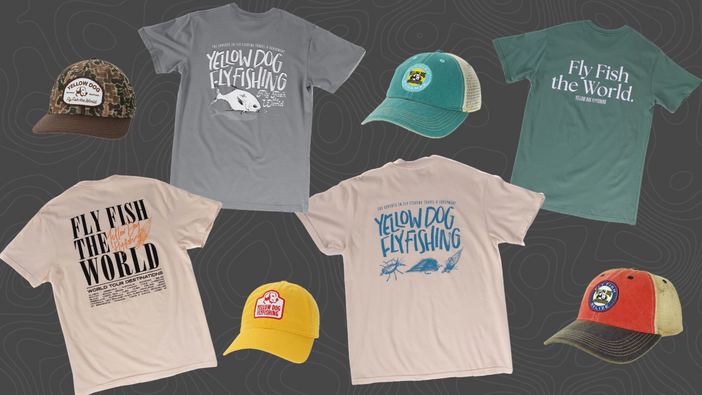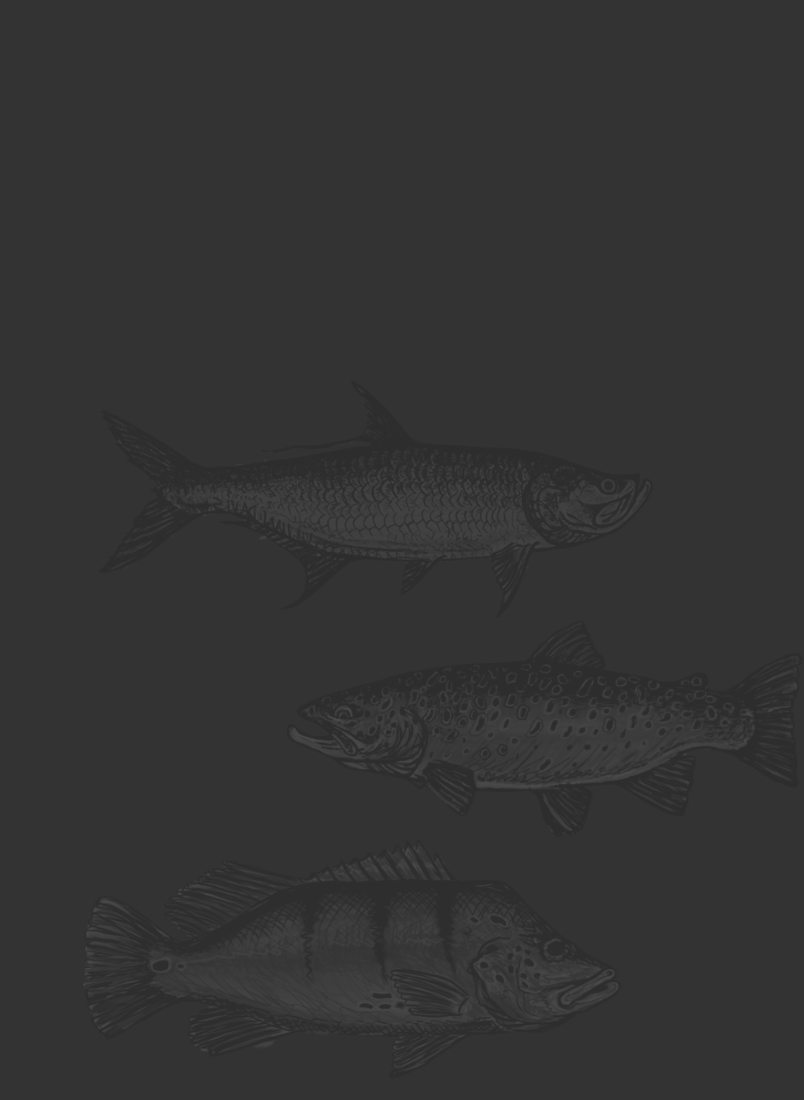PREPARATION FOR THE WIN
If you've found your way to this website, then you probably know that Yellow Dog Flyfishing Adventures is a destination angling booking company that sends hundreds of anglers a year all over the world in the pursuit of fish. And over the years of booking trips and fishing the world ourselves, we have learned one very important lesson about destination trips — especially those that involve international travel to distant waters. The more time you spend preparing for your trip prior to departure, the more you improve your odds of a successful and enjoyable saltwater adventure!
Here are a handful of great tips and suggestions that will help when planning your next adventure.
1. Make a List
Do yourself a favor and create a detailed and well-thought-out gear and equipment list. Save this list and make it your “go-to” reference list whenever you plan a fishing trip that will take you far from home. This list should be a fluid, changing, and ever-evolving tool, meaning that you should constantly add information by reading, researching, and taking notes after each and every trip. The lists that we use and send to all of our clients are lists that we have spent years creating and fine-tuning. The lists are designed to ensure that our customers travel with the right type and the right amount of equipment that is applicable and relevant to their destination.

2. Your “Go-To Gear List” Should Include the Following:
▪ Fishing equipment and tackle: rods, reel, lines, leaders, backup gear, spare spools, etc.
▪ Personal clothing: fishing shirts, warm clothes, rain gear, and headgear
▪ Personal: toiletries, necessary medication, books, etc.
▪ Documents: passport, drivers license, and photocopies of everything
▪ Sunscreen and insect repellant – don’t ever leave home without these things!
▪ Optional items as binoculars, alarm clock, writing materials, and other things
3. P.C.I. Your Equipment
In the military, P.C.I. stands for "Pre Combat Inspection." In the world of fishing, this means that you should double-check your gear prior to leaving on a trip. Don’t wait until you arrive at a distant and remote lodge to discover that your rod tip is broken, your fly line is cracked, or your backing has mildewed and rotted. Preventative maintenance on your gear – before, during, and after a trip - will add years to the life of your equipment.
4. Practice Your Casting
Practice your casting prior to leaving for a trip - and then practice, practice, practice some more! This is especially applicable if you are heading to the saltwater. Anglers who are proficient on their local trout stream with a 5-weight oftentimes don’t realize that casting a 10-weight into the wind is a different game altogether. Practice casting with your saltwater set-up prior to your departure. For best results, pick a stormy day at home, and practice casting both into and across the wind. For the best casting preparation, try casting at moving targets as well. That miserable cat that your girlfriend brought home last month has got to be good for something!
Want to go further? Listen to this WAYPOINTS podcast: JOHN HUDGENS: How to Up Your Game and Improve Your On-Water-Skills For Destination Angling
5. Get Your Paperwork in Order
Check your passport and travel documents to make sure that everything is valid and up-to-date. Don’t wait until you arrive at the airport to find out that your passport is expired!

6. Carry-on the Important Things
Whenever a flight is involved, try to carry on your rods, reels, flies, sunglasses, a pair of shorts, sunscreen, and other important items that will allow you to fish for a day or two in the event that your checked luggage is lost or delayed. Click here to read about how to pack a fishing and T.S.A friendly carry-on bag.
7. Label Your Gear
Make sure that all of your checked and carry-on luggage is labeled with your current ID information. Use luggage tags on the outside, and include identification on the inside as well, in the event that a luggage tag is yanked off or destroyed.
8. Take Care of Your Eyes
Aside from the right rod and reel set-up, polarized sunglasses are perhaps the most important piece of equipment you’ll bring with you. In many situations (especially saltwater!) spotting fish in the saltwater is crucial and can make all the difference in the success of a trip. For this reason, you should buy the very best polarized sunglasses you can. For lenses, light amber or brown will work well in most situations. We prefer sunglasses that shape our face and block out as much peripheral side and top light as possible. Bring a second pair in case the first one breaks or is lost!

9. Record the Trip
If you’re like most anglers, you will probably want to bring your camera gear along with you on the river or in the boat. If so, then you will want to be sure that it is protected at all times. A good waterproof camera bag or hard-sided box is a must, as salt spray and/or water are constant factors. Be sure to bring lots of extra film, extra memory cards, spare batteries, and soft lens cloth and solution for cleaning. If you still shoot film or slide film, remember that any film packed inside your checked baggage will be ruined by new baggage screening devices. Carry on your film and camera equipment, and request a hand-check if you have any doubt about the carry-on screening process. If you are shooting slide or print film, then we recommend a “leaded” film pouch that will protect your film from screening devices.
Need a photography refresh? Check out 5 Basic Fly Fishing Photography Tips
10. The Most Important Rule of Them All - Manage Your Expectations
First and foremost, you need to remember that saltwater fishing is not easy, and regardless of how much you may spend on a trip, nothing is guaranteed when it comes to landing fish. The ocean is a very dangerous environment, where everything in the ecosystem is either in the process of eating or being eaten. As a result, the saltwater gamefish that anglers pursue (namely bonefish, permit, tarpon and snook) are by nature very spooky, hyper-alert fish. Fooling these fish into eating an artificial fly or lure is a challenge, and even on the best of days, hooking and landing any of these species can be difficult. Every fish that you catch is special. That may sound like a bad Hallmark card, but it’s absolutely true. Whether you’re landing your first bonefish on a fly or finally catching a trophy tarpon or permit, take a moment to appreciate every fish that comes your way. Every single fish that is hooked and landed is a gift and should be appreciated as such. Take a moment to enjoy every shot and hook-up, and remember where you are and why you are there! With that kind of mindset, you can’t help but enjoy your trip, regardless of weather, conditions, or the size or number of fish caught.
11. Cover Your Bases
Cover your bases with a simple, easy, and inexpensive trip insurance policy. It won’t cost you very much, and it only takes about five minutes to set it up. And while you’ll probably buy a policy and never need it, if and when you do, it will be the best money that you’ve ever spent! Trust us on this one. We know what we’re talking about.
Did we mention that saltwater fishing is not an easy thing to do? Yes? Well, we’ll mention it one more time. No matter how much you’re spending and how much work has gone into your trip (and we promise you that a LOT of work has gone into it from our end!) keep in mind that fooling ultra-spooky, ultra-selective fish into eating the chicken feathers and belly-button lint tied onto a piece of sharp metal is never easy. If you’re someone who needs guaranteed success and definitive returns on the exact number of fish caught, then you’re probably in the wrong game!
Have a great trip, and know with the right amount of preparation, planning, and practice, you have set yourself up for a successful and enjoyable angling experience!
Related Articles:
- Top Saltwater Destinations for the Single Traveling Angler
- The 8 Best Bonefishing Destinations In The World
- Top Spring Break Fly Fishing Trips: Destinations for the Angler and Non-Angler
- Destinations For The Saltwater Fly Fishing Father In Your Life
- Caribbean Destinations For The Hardcore Saltwater Angler
- The Best Flats Fly Fishing Trips: A World-Wide Guide
- Fly Fishing Mexico's Yucatan Peninsula in the Off-Season





























